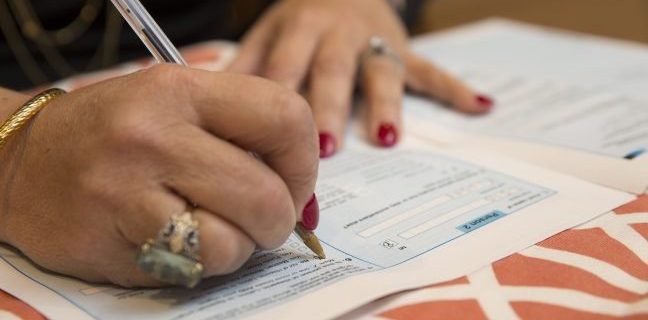
Written by Tory Russo
Tory Russo, The City of Syracuse’s Census Coordinator for the United States Census Bureau 2020 Census count, shares the importance of every resident being counted.
In 2020, the U.S. Census Bureau will conduct the nation’s next census. It happens every 10 years and aims to count every person living in the United States. A complete and accurate count of communities is critical. In addition to providing basic population characteristics of U.S. residents, census data is used to reapportion congressional seats allocated to each state in the House of Representatives, redraw legislative boundaries, and distribute more than $675 billion federal dollars to states each year.
After the 2010 Census, New York State has lost two representatives and more than $1.5 billion of federal funds to our state each year since then. Even a 0.6 percent undercount in 2020 will result in the loss of two additional representatives and could affect federal funding that supports hundreds of vital community programs and services like Medicaid, Medicare, SNAP, WIC, Head Start, school lunches, highway planning and construction, and business and industry loans.
One of those programs is the Community Block Grant Development program. The U.S. Department of Housing and Urban Development (HUD) determines the amount of each grant with a formula that considers population and a number of other factors. In the most recent fully-funded year, May 2018 to April 2019, the City of Syracuse received almost five million dollars. This was reallocated to fund programs at organizations including ARISE, Catholic Charities, Dunbar Center, Home HeadQuarters, InterFaith Works, Jubilee Homes, NEHDA, and the YWCA.
The impact of the census on communities is significant – and so is the challenge of counting everyone.
More than 30 of the 55 census tracts in the City of Syracuse had self-response rates below 73 percent in the 2010 Census. This means more than one-quarter of households in these tracts did not complete their census and required follow-up by Census Bureau enumerators, which increased the risk that people were missed. These response rates caused these tracts to be ranked among the “hardest-to-count” tracts in the country.
In an effort to help communities identify hard-to-count (HTC) areas and support the development of communications and outreach about the 2020 Census, the Census Bureau launched its Response Outreach Area Mapper (ROAM) tool. This map uses data to predict the percentage of households that will not respond to the 2020 Census. Again, more than half of the tracts in Syracuse are expected to have below a 73 percent self-response rate in 2020.
So, what’s being done?
Communities across the country, including Syracuse and Onondaga County, have assembled Complete Count Committees (CCC) to inform residents about why the census is important, how they can make sure they’re counted, and what temporary job opportunities are available through the Census Bureau.
These multi-sector coalitions have been developing outreach plans, focused on reaching people who have been traditionally and historically undercounted, including: immigrants and mixed-status households, migrant workers; refugees; young children, people of color; people in rural areas and people lacking internet access.
The Syracuse-Onondaga County Complete Count Committee (SOC-CCC) consists of more than 20 subcommittees categorized as engagement, government, community, education, or business. These subcommittees have been meeting regularly since August 2019 to form and implement action plans for census outreach in local HTC neighborhoods and communities.
The City is supporting the SOC-CCC by providing trainings and updates, developing communications campaigns and materials, and coordinating activities with community stakeholders. The County is focusing on outreach and education in Onondaga County’s hardest-to-count rural communities, by coordinating with libraries across the county and supporting the formation of Complete Count Committees in towns and villages.
In addition, the City of Syracuse and Onondaga County have been applying for grants to fund a Census Ambassador Program and an outdoor advertising campaign, respectively, and coordinating with state and federal government representatives to better align local efforts.
But all of these efforts require participation and support from organizations and individuals who can work to ensure that residents of every city, town, and village in Central New York know our communities count.
So, what can you do?
- Learn more by following the Census Bureau @uscensusbureau and skimming these suggested resources:
- Why We Ask Each Question 2020 Census Question (Census Bureau)
- How the 2020 Census Will Invite Everyone to Respond (Census Bureau)
- The 2020 Census and Confidentiality (Census Bureau)
- Counting for Dollars 2020: The Role of the Census in the Distribution of Federal Funds
- Why a Fair and Accurate Census Matters to Thriving Private and Public Sectors
- Inform and encourage your network by participating in our #Take20 for #Census2020 campaign:
- Take 20 seconds to record a video explaining why you plan to complete the census and share it on your social media accounts.
- Take 20 minutes to talk with your family, friends, neighbors, and colleagues about the importance of the census.
- Take 20 minutes to complete your census in 2020 and encourage your employer to designate a day and time in April 2020 for staff to complete it.
- Participate in local “Calls to Action” on the 20th of each month. Contact 2020Census@syrgov.net to be added to the listserv.
- Apply or help others apply for a temporary, part-time job with the Census Bureau
- Local census takers will be paid $17 per hour
- Income won’t affect eligibility or benefit amounts for most assistance programs
- Certain noncitizens are eligible to be hired
- Volunteer with a Complete Count Committee
- Sign up to volunteer with the SOC-CCC at bit.ly/soccccsignup (link is case-sensitive)
- Search for your local complete count committee via the Census Bureau

Recent Comments